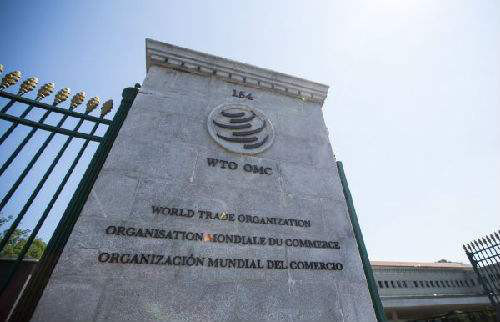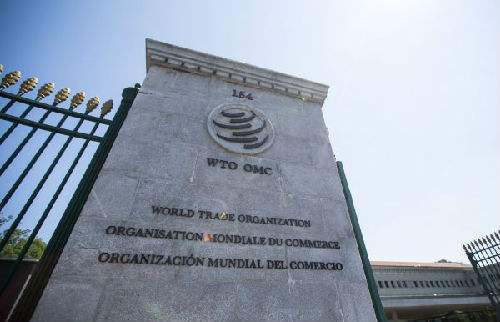By Sourabh Gupta

In mid-January, United States Trade Representative (USTR) Robert Lighthizer raised eyebrows when he observed that the US had erred in supporting China's entry into the World Trade Organization (WTO). Judging by the broad appreciation of China's trade policies and practices expressed by numerous country delegations at its recently-concluded seventh WTO Trade Policy Review in Geneva, Mr. Lighthizer's observations are unrepresentative and misguided.
China's accession to the WTO on December 11, 2001, following a protracted 15 years of negotiations, was the biggest coming-out party in the history of development. Its active role within the organization as well as the important contributions to global growth in the subsequent decade-and-a-half is an eloquent testimony to the virtues of reform and opening-up and the benefits of cooperative multilateralism. And, ironically, far from disadvantaging America, it has been one of the biggest beneficiaries of China's entry. As China's average tariff rate on manufactured goods shrank from 15 percent in 2001 to single digits today, US exports of goods have risen from $19 billion in 2001 to $127 billion in 2017 – an almost seven-fold increase. Furthermore, over the past decade, US exports of goods to China have grown by 86 percent compared to 21 percent to the rest of the world.
Lighthizer's observation that the US erred in supporting China's entry into the WTO is also deeply disrespectful. Given its late date of entry (it entered as the organization's 143rd member), China was obliged to accept accession commitments and encumbrances that substantially exceeded those made by other acceding countries or by member-states at a comparable level of development. Deep mandated tariff cuts aside, these limits on its trading freedoms included an interim China-specific safeguard, an interim special textile safeguard as well as the right of trading partners to treat China as a non-market economy for 15 years during anti-dumping investigations.
China has displayed a humble and remedial attitude, too, when faced with adverse judgments within the WTO's dispute settlement system. No case of countermeasures pursuant to Article 22.6 of the dispute settlement understanding for not having complied with an arbitral verdict has been sought by a trading partner against China. The same cannot be said of the multilateral trading system's other major countries. The US, in particular, features prominently within this Article 22.6 roll of shame.
China has been a diligent rule-taker in the multilateral trading system. Looking ahead, as China transitions from being a great trading power to a great trading and investment power, it must now also become a rule-maker that helps craft the rules-of-the-road for a deepened investment framework in the multilateral system.
At the 11th ministerial conference in Buenos Aires in December 2017, a subset of WTO members including China resolved to pursue structured discussions leading to the creation of a multilateral framework on investment facilitation. China must take a co-leadership role within these discussions and devise an adaptive, responsive and resilient facilitation framework – one that substantially liberalizes global investment flows across a range of goods and services sectors while protecting the right of countries to regulate in the public interest to meet their policy objectives.
Along the way, China should also modify certain foreign inward investment-related practices which, rightly or wrongly, have caused misgivings among its trading partners. These misgivings, which were aired at the recent WTO trade policy review, relate to the as-yet preponderant role of the state in general, and its inconsistent administrative and regulatory practices related to technology transfer requirements in particular. These include intellectual property rights-related regulations which, at times, appear to depart from the 'national treatment' principle and accord less favorable treatment to foreign intellectual property rights-holders compared to domestic Chinese rights-holders in the course of technology transactions.
The 'national treatment' principle as well as the 'most favored nation' principle has been the foundational pillar of the international trading system. In the hands of imperial powers, the latter was utilized as a tool of subjugation and abuse. As Article 8 of the supplement to the Opium-era Treaty of Nanjing, the principle provided the basis for foreign powers to exploitatively strip China of control over its customs boundary and tariff-levying powers. In the post-World War II age of sovereign equality of nation-states, the two principles have been a powerful force for good, providing a ladder of development that allowed countries to break out of poverty traps and grow wealthy.
As China becomes a prodigious exporter of capital as part of its Belt and Road initiative (BRI), it must now take the lead in mainstreaming the 'national treatment' principle and the 'most favored nation' principle within the WTO's embryonic multilateral framework on investment facilitation. "That international trade should be abundant, that it should be multilateral, that it should be non-discriminatory" was the widely-expressed sentiment at the Preparatory Committee gathered in October 1946 to frame the charter for the post-war global trading order. China must endeavor to inscribe that sentiment as the guiding principles of the 21st century global investment order too.
(People’s Daily)
China's accession to the WTO on December 11, 2001, following a protracted 15 years of negotiations, was the biggest coming-out party in the history of development. Its active role within the organization as well as the important contributions to global growth in the subsequent decade-and-a-half is an eloquent testimony to the virtues of reform and opening-up and the benefits of cooperative multilateralism. And, ironically, far from disadvantaging America, it has been one of the biggest beneficiaries of China's entry. As China's average tariff rate on manufactured goods shrank from 15 percent in 2001 to single digits today, US exports of goods have risen from $19 billion in 2001 to $127 billion in 2017 – an almost seven-fold increase. Furthermore, over the past decade, US exports of goods to China have grown by 86 percent compared to 21 percent to the rest of the world.
Lighthizer's observation that the US erred in supporting China's entry into the WTO is also deeply disrespectful. Given its late date of entry (it entered as the organization's 143rd member), China was obliged to accept accession commitments and encumbrances that substantially exceeded those made by other acceding countries or by member-states at a comparable level of development. Deep mandated tariff cuts aside, these limits on its trading freedoms included an interim China-specific safeguard, an interim special textile safeguard as well as the right of trading partners to treat China as a non-market economy for 15 years during anti-dumping investigations.
China has displayed a humble and remedial attitude, too, when faced with adverse judgments within the WTO's dispute settlement system. No case of countermeasures pursuant to Article 22.6 of the dispute settlement understanding for not having complied with an arbitral verdict has been sought by a trading partner against China. The same cannot be said of the multilateral trading system's other major countries. The US, in particular, features prominently within this Article 22.6 roll of shame.
China has been a diligent rule-taker in the multilateral trading system. Looking ahead, as China transitions from being a great trading power to a great trading and investment power, it must now also become a rule-maker that helps craft the rules-of-the-road for a deepened investment framework in the multilateral system.
At the 11th ministerial conference in Buenos Aires in December 2017, a subset of WTO members including China resolved to pursue structured discussions leading to the creation of a multilateral framework on investment facilitation. China must take a co-leadership role within these discussions and devise an adaptive, responsive and resilient facilitation framework – one that substantially liberalizes global investment flows across a range of goods and services sectors while protecting the right of countries to regulate in the public interest to meet their policy objectives.
Along the way, China should also modify certain foreign inward investment-related practices which, rightly or wrongly, have caused misgivings among its trading partners. These misgivings, which were aired at the recent WTO trade policy review, relate to the as-yet preponderant role of the state in general, and its inconsistent administrative and regulatory practices related to technology transfer requirements in particular. These include intellectual property rights-related regulations which, at times, appear to depart from the 'national treatment' principle and accord less favorable treatment to foreign intellectual property rights-holders compared to domestic Chinese rights-holders in the course of technology transactions.
The 'national treatment' principle as well as the 'most favored nation' principle has been the foundational pillar of the international trading system. In the hands of imperial powers, the latter was utilized as a tool of subjugation and abuse. As Article 8 of the supplement to the Opium-era Treaty of Nanjing, the principle provided the basis for foreign powers to exploitatively strip China of control over its customs boundary and tariff-levying powers. In the post-World War II age of sovereign equality of nation-states, the two principles have been a powerful force for good, providing a ladder of development that allowed countries to break out of poverty traps and grow wealthy.
As China becomes a prodigious exporter of capital as part of its Belt and Road initiative (BRI), it must now take the lead in mainstreaming the 'national treatment' principle and the 'most favored nation' principle within the WTO's embryonic multilateral framework on investment facilitation. "That international trade should be abundant, that it should be multilateral, that it should be non-discriminatory" was the widely-expressed sentiment at the Preparatory Committee gathered in October 1946 to frame the charter for the post-war global trading order. China must endeavor to inscribe that sentiment as the guiding principles of the 21st century global investment order too.
(People’s Daily)
 Menu
Menu
 China must lead trade, investment multilateralism at the WTO
China must lead trade, investment multilateralism at the WTO
















